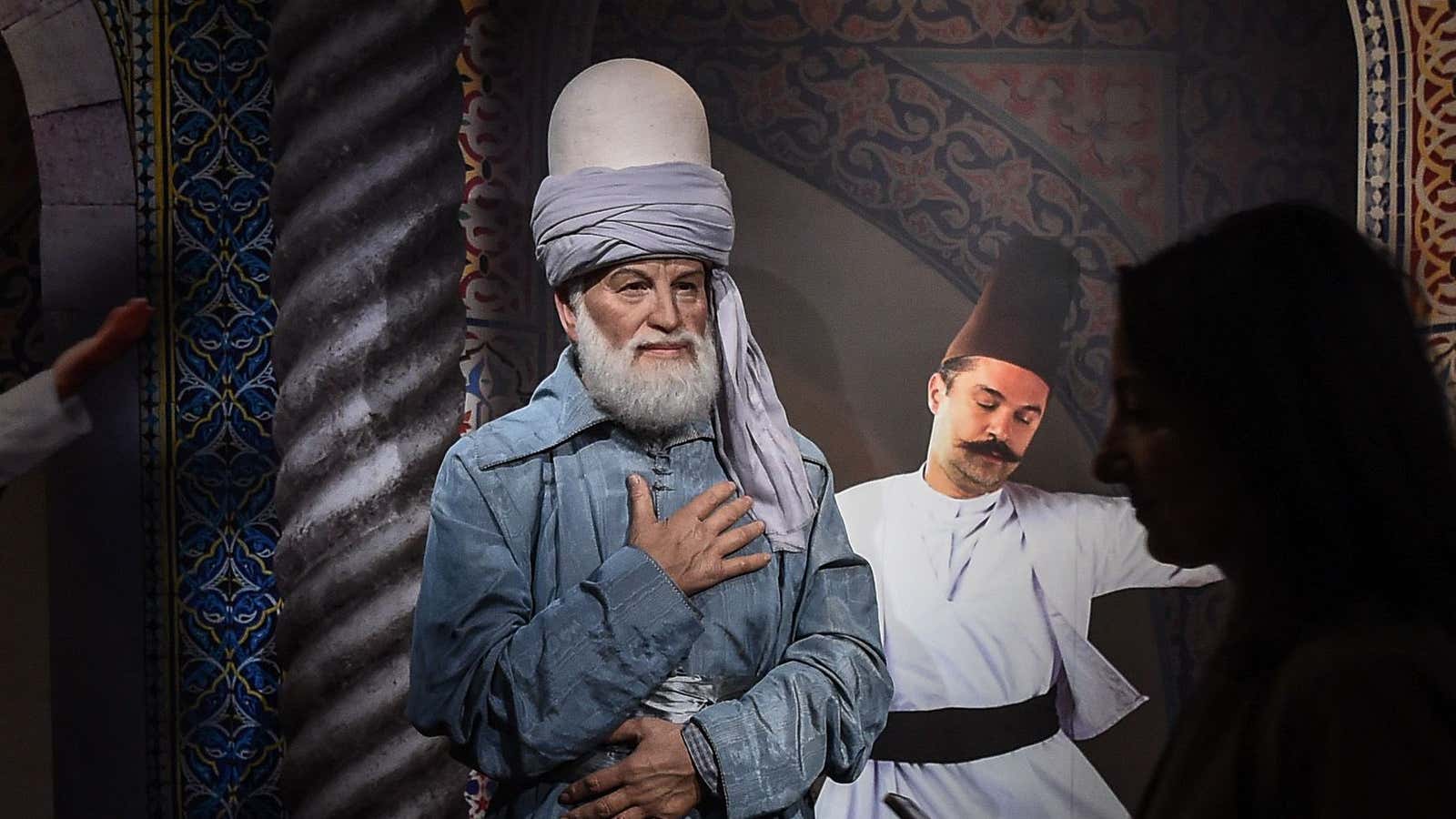When Beyoncé released a photo of her twins, Sir Carter and Rumi, on Instagram today, the musician and pop culture icon triggered a spike in internet searches for the coded messages behind both names.
Millions of people in the US and around the world, however, will already be familiar with “Rumi” and its appeal: Rumi is the popular name for Jalal ad-din Rumi, a 13th-century mystic poet and Muslim, who has become a social media mainstay and is reportedly one of America’s best-selling poets.(“Sir” is thought to have at least partly been inspired by a reference in one of his poems.)
For the uninitiated, even modest exposure to Rumi’s work will make it clear why he has come to mean so much to his Western readers, presumably including Beyoncé and Jay-Z. The poet’s most repeated lines speak of deep and limitless love, universalism, and the wealth that comes from spiritual seeking.
Born in 1207 in what is now Afghanistan, the poet lived as a refugee—fleeing violent campaigns of Genghis Khan—for much of his early life. He studied Islam and became an imam in Aleppo, and spent the bulk of his later years in Konya, in what is now Turkey, where he ran a seminary. His appeal went beyond the Sufi community then, too: Rumi, having introduced music, whirling, and his own charisma as part of his worship services, attracted royalty, and admirers from Jewish and Christian faiths.
Like Shakespeare’s sonnets and plays, Rumi’s writing maintains a vitality no matter how often it’s tweeted, instagrammed, or recited as part of a pop song. A few samplings:
Rumi’s path to social media ubiquity was a winding one. As it turns out, the vast majority of the Rumi lines English speakers repeat and crib from when writing toasts and wedding speeches come via the work of one man, Coleman Banks, a poet born in Chattanooga, Tennessee.
According to his story, as told to the New Yorker, American poet Robert Bly handed Barks a book of Rumi’s writings in the 1970s—not the original Persian texts, but a version by the Victorian translator A.J. Arberry. Bly said the poems needed to be “released from their cages,” so Barks set the work to American free verse.
The story of what happened when Barks stepped into the picture is rather romantic and mystical in itself: Barks told the New Yorker that he had a dream one night in which he was sleeping “on a cliff near a river,” when “a stranger appeared in a circle of light and said, ‘I love you.’” One year later, according to Barks, he met that man at a Sufi order near Philadelphia—the stranger was the order’s leader. That’s when Barks began translating Rumi in earnest.
As much as his interpretations have been rightly celebrated, there’s also been some criticism of the Rumi pop culture breakout that followed. That’s because Victorians had already begun detaching Rumi’s writing from its roots in Islam, and Barks’s subsequent translations were even more removed from their origins. New Age writers would later toss out all religious references in their own versions of Rumi’s prose. A Rutgers University scholar of Sufism, Jawid Mojaddedi, told the New Yorker, “The Rumi that people love is very beautiful in English, and the price you pay is to cut the culture and religion.”
Rumi became a poet in his late thirties under the influence of an intense relationship with his “beloved” teacher and eventual muse (and some have theorized, his lover), the mystic theologian Shams of Tabriz, he who also inspired Rumi to practice whirling meditation, writes the biographer Brad Gooch.
Still, Rumi’s philosophy is said to be grounded in the Koran, which he references often. Fatemeh Keshavarz, a professor of Persian studies at the University of Maryland spoke to the radio show On Being about the poet’s enduring legacy, and explained that “Rumi was steeped in Islam.” On Being’s publisher and co-founder Trent Gillis wrote on the site’s blog:
He represents and speaks to “an adventurous and cosmopolitan Islam.” The generous, cross-cultural appeal of his words reflects ideas at the core of Islam that are muted by the extremists and headlines of our time. To the extent that Rumi would deny or subvert those, he does so through his grounding in Islamic tradition, and his profound love for it.
Beyoncé’s spotlight on the name is sure to bring more awareness to Rumi’s exquisite writings. One hopes the couple’s choices will bring awareness to its Islamic roots, as well, especially at a time when the religion is relentlessly demonized.
Either way, the poets’s cultural moment will live on: David Francioni, who wrote the movie Gladiator, has a biopic in the works.
